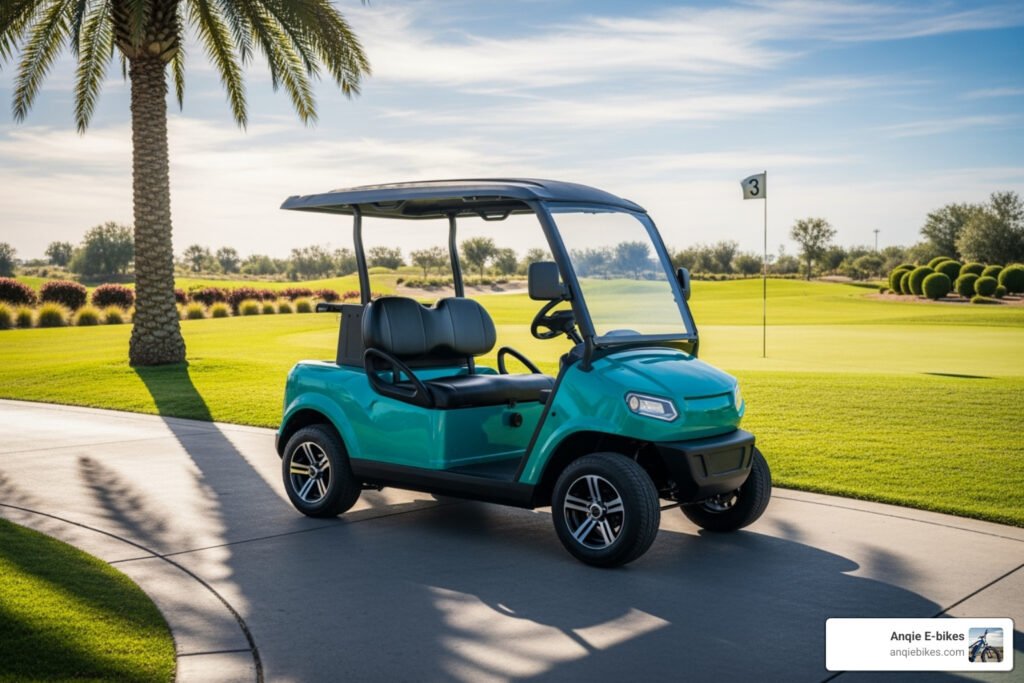Why Mini Golf Cart Reviews Matter Before You Buy
Mini golf cart reviews show that these compact electric vehicles are a practical, affordable alternative to full-sized carts, often costing less than half the price while offering surprising versatility. Here’s a quick overview:
| Key Consideration | What to Expect |
|---|---|
| Price Range | $3,500 – $7,900 (vs. $10,000+ for full-sized carts) |
| Portability | Many collapse to fit in SUVs, truck beds, or RVs |
| Range | 20-50 miles per charge, depending on model |
| Top Speed | 9-16 mph (most are not street-legal LSVs) |
| Best For | RV parks, neighborhoods, campgrounds, large properties |
If you’ve been deterred by the cost and size of a traditional cart, mini golf carts are the answer. These compact vehicles have evolved into multi-functional electric transports that fit in your garage, collapse for travel, and handle everything from gravel roads to RV parks. Some models, like the Kandi Mini, collapse to just 66 inches long, while others offer rear seats and can haul up to 600 pounds.
The challenge is sorting through marketing hype to find honest information. This guide cuts through the noise with comprehensive mini golf cart reviews based on specifications, user experiences, and expert analysis. We’ll cover everything from collapsible designs to the critical details manufacturers don’t always highlight.
I’m Mark Stark, and I’ve spent years in the electric vehicle market. Through researching mini golf cart reviews and speaking with owners, I’ve learned what separates a smart purchase from an expensive regret—and I’m here to share that knowledge with you.
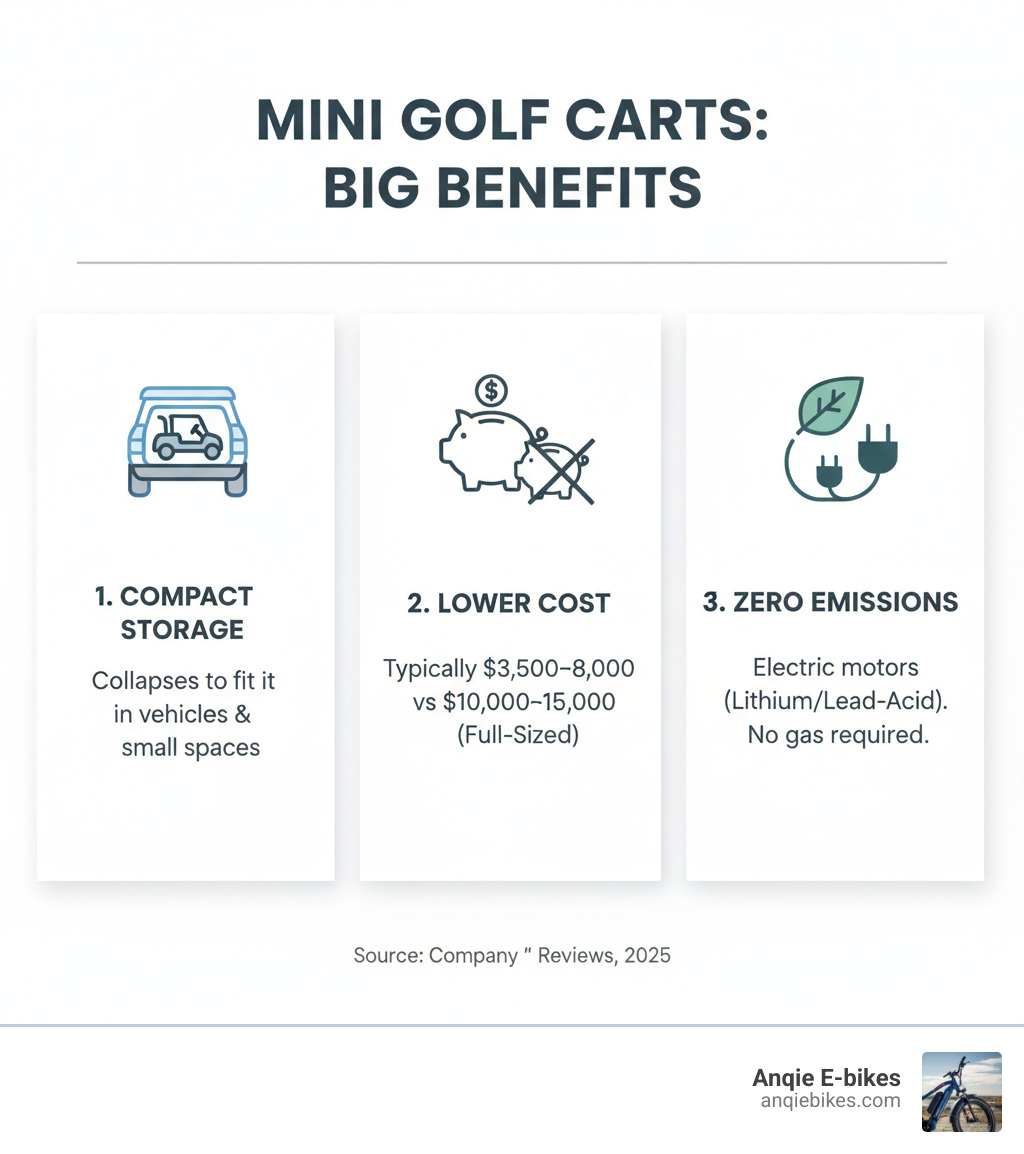
Why Go Mini? The Big Advantages of Small Carts
Mini golf cart reviews consistently highlight one truth: these little vehicles provide real-world usefulness. They are purpose-built solutions for people who need convenient transportation without the headaches of full-sized vehicles. Let’s break down the advantages that have RV owners, families, and property managers choosing mini over standard.
The Portability Game-Changer
Mini carts shine because they fit into your life. A full-sized golf cart requires a trailer and special storage. In contrast, many mini models are designed for travel. The Kandi Mini, for example, folds from 96 inches down to just 66 inches long—short enough to fit in the back of an SUV, pickup truck bed, or even a minivan. For RV enthusiasts, this is revolutionary. You can stow it in your RV’s basement storage, unfold it at your destination, and have instant wheels for exploring.
Even at home, the compact size is a major benefit. A mini cart can fit in a standard garage, freeing up space for your car or other storage needs.
The Price Tag That Makes Sense
A new full-sized golf cart typically runs from $10,000 to $15,000. Mini golf carts start around $3,500 for budget-friendly models, with more advanced versions rarely exceeding $8,000. This affordability opens up electric transportation to a much wider audience, making it a practical purchase rather than a distant luxury.
Maneuvering Through Your Actual Life
The smaller footprint improves day-to-day use. Mini carts have a tighter turning radius, allowing them to steer narrow paths and park in small spaces. This makes them perfect for gated communities, large properties, and campgrounds with tight corners.
Their quiet electric motors provide smooth, instant torque without the noise or smell of a gas engine. This combination of compact size, reasonable cost, and zero-emission power creates a surprisingly versatile transportation solution that fits your everyday life without demanding major compromises.
The Ultimate Buyer’s Guide: Key Features to Scrutinize
Shopping for a mini golf cart is simpler once you understand the key specifications. This checklist will help you choose the right cart and avoid an expensive mistake.
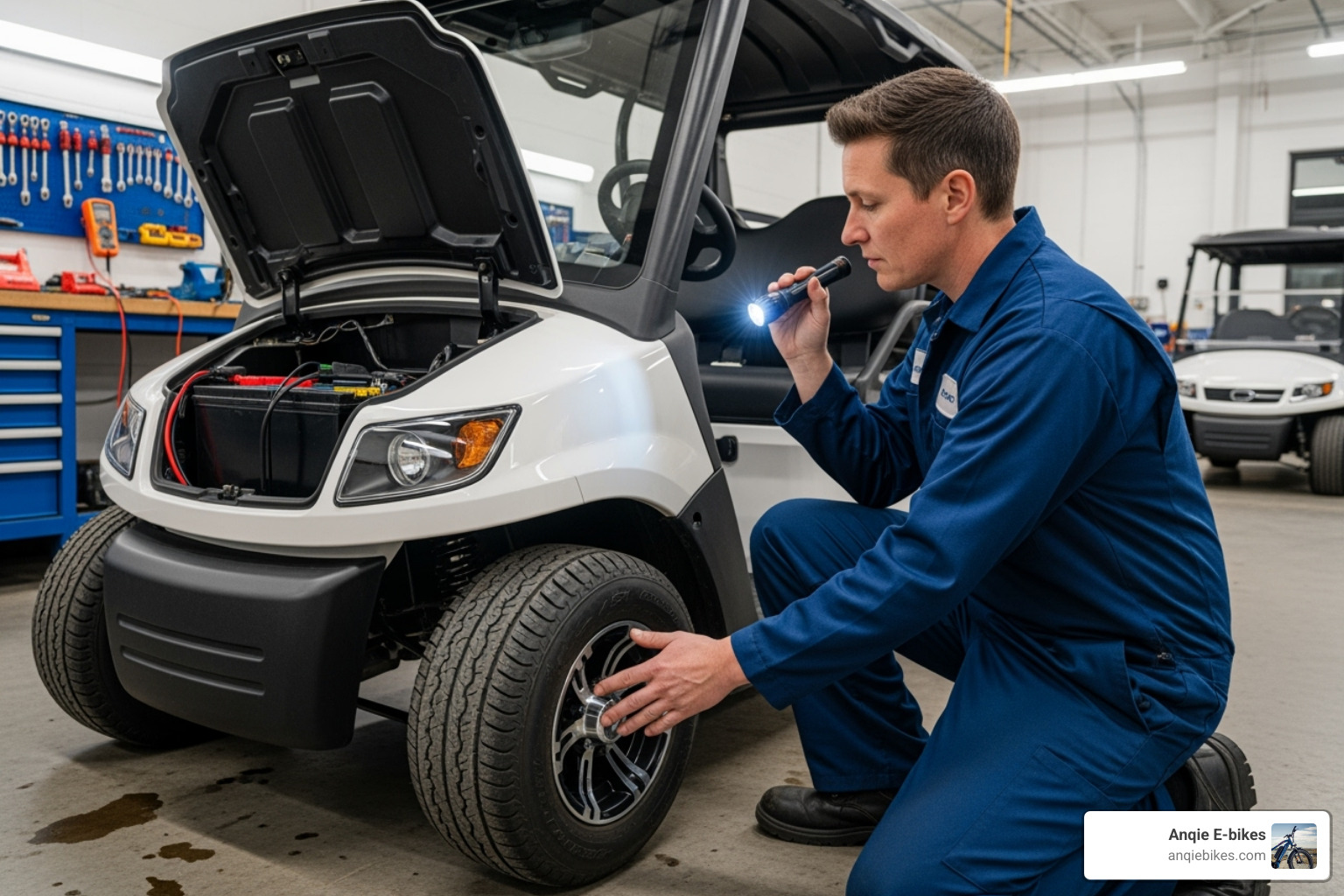
What to Look for in a Mini Golf Cart
Size and Weight: Portability is key. Check the collapsed dimensions to ensure it fits your SUV, truck bed, or RV storage. The Kandi Mini folds to 66 inches and weighs around 400 pounds. Lighter models exist, but even a 60-pound difference is noticeable when loading.
Seating and Weight Capacity: Most mini carts seat one or two passengers. The Kandi Mini has a 400-pound limit, which is suitable for two average adults. If you need to carry more passengers or gear, look for models with rear seats and higher capacities, some of which can handle up to 600 pounds.
Battery Technology: This is a critical differentiator. The Kandi Mini uses a 1.8 kWh Lithium Iron Phosphate (LiFePO4) battery, which lasts longer, charges faster, and weighs less than traditional lead-acid batteries. A quality battery is essential, as battery-related issues are a common complaint in user reviews.
Range and Charging Time: Expect a range of 25 miles on a single charge, which is plenty for most daily activities. Real-world range depends on terrain, weight, and driving style. Most carts charge in 4-6 hours from a standard household outlet.
Motor Power and Top Speed: The Kandi Mini’s 1,000-watt motor provides capable performance for cruising on grass, gravel, and moderate inclines. Top speeds of 9-16 mph are typical and ideal for neighborhoods and campgrounds.
Ground Clearance and Suspension: For off-pavement use, look for adequate ground clearance. The Kandi Mini has about six inches of clearance and an independent front suspension, which handles uneven ground well. Lifted models offer more clearance for rugged terrain.
New vs. Used: A Cost-Benefit Analysis
Buying new ensures you get the latest technology, like advanced LiFePO4 batteries, modern motors, and a full warranty. The Kandi Mini includes a three-year battery warranty, offering peace of mind since a replacement can be costly. New carts are more reliable and have no hidden history of misuse.
Buying used costs less upfront, but it comes with risks. Battery degradation is the biggest concern, as a worn-out battery is expensive to replace and severely limits the cart’s usefulness. You’re also buying an unknown history without warranty coverage, leaving you responsible for all repairs.
For most buyers, especially first-timers, buying new is the smarter investment. The reliability and warranty coverage, particularly for the battery, justify the higher initial cost.
2024’s Top Picks: In-Depth Mini Golf Cart Reviews
Based on real-world testing and owner feedback, this section dives into models that deliver on the “mini” promise—compact enough for your life, yet powerful enough to be practical.
The Ultra-Compact Collapsible Cart: An Honest Mini Golf Cart Review
The Kandi Collapsible Mini Electric Golf Cart is a surprisingly capable vehicle that redefines portability.
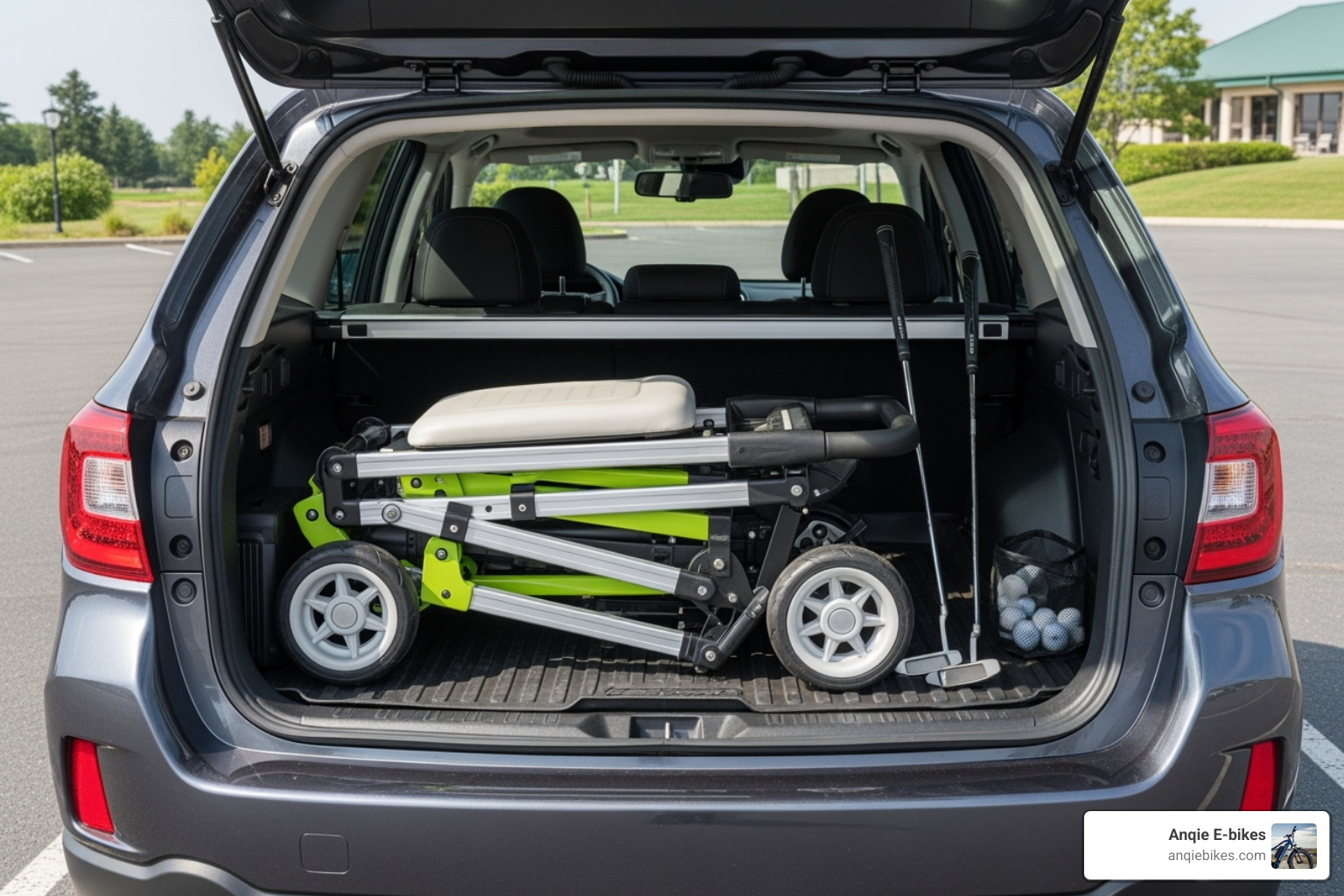
At around $3,999, it costs less than half of a traditional golf cart while offering clever engineering. Its standout feature is the collapsible design. The cart shrinks from 96 inches to just 66 inches (5’6″), allowing it to fit in minivans, SUVs, and RV storage compartments. This is a game-changer for travelers and those with limited garage space.
Performance is well-suited for its purpose. The 1,000W motor provides a top speed of 9-10 mph, which owners find ideal for cruising campgrounds and neighborhoods. The 1.8 kWh Lithium Iron Phosphate (LiFePO4) battery comes with a 3-year warranty and delivers a 25-mile range. A percentage-based battery meter adds a layer of confidence.
Despite its size, it handles varied terrain well, thanks to its independent front suspension and six inches of ground clearance. The seating is practical, with room for two adults and a rear seat that converts to a cargo bed. The 400 lb weight limit is sufficient for most couples.
Attention to detail includes automotive-style paint, aluminum wheels, and hydraulic disc brakes. While the 9-10 mph top speed and 400 lb weight limit aren’t for everyone, this cart is perfect for those who prioritize portability and affordability. It’s an excellent choice for RV adventures, campsite cruising, and neighborhood errands.
You can explore the Kandi Collapsible Mini Electric Golf Cart and available accessories at Anqie E-bikes.
The All-Rounder for Travel and Everyday Use: An Honest Mini Golf Cart Review
For those needing more muscle without sacrificing portability, mid-range mini carts offer a versatile solution.
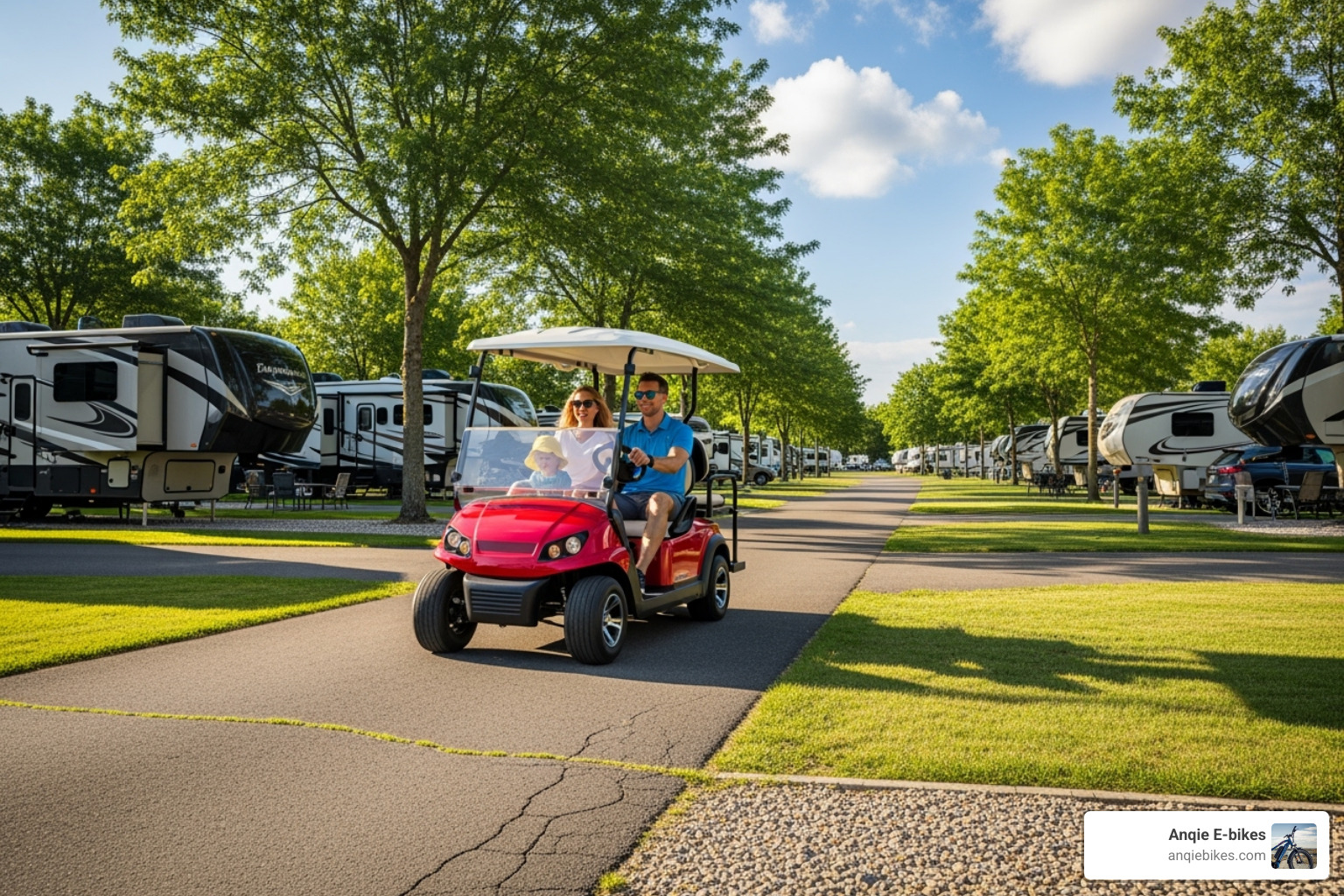
These all-rounders are built for maximum versatility. They often feature higher weight capacities (up to 600 pounds) and rear seats that convert to cargo beds, providing flexibility for passengers or supplies. This adaptability makes them popular in large RV parks and gated communities.
While not always as compact as ultra-collapsible models, they are still designed to fit in RV storage, truck beds, and SUVs, with typical weights around 400-420 pounds. Loading ramps are recommended.
Performance is reliable, with top speeds around 10 mph and motors that provide adequate power. The main advantage over smaller models is the increased weight capacity and more robust construction. Specialized options in this category include lifted versions for off-road use and models with oversized tires for sand.
Build quality is often a step up, with solid warranties reflecting manufacturer confidence. The primary trade-off is weight; these carts are heavier and can be more challenging to load. However, for RV travelers and property owners needing serious hauling capacity and versatility, these all-rounders represent a sweet spot where portability meets capability.
Ownership 101: Maintenance, Legality, and Customization
Understanding the practical side of ownership will help you enjoy your mini golf cart for years. Heres what you need to know about legality, maintenance, and personalization.
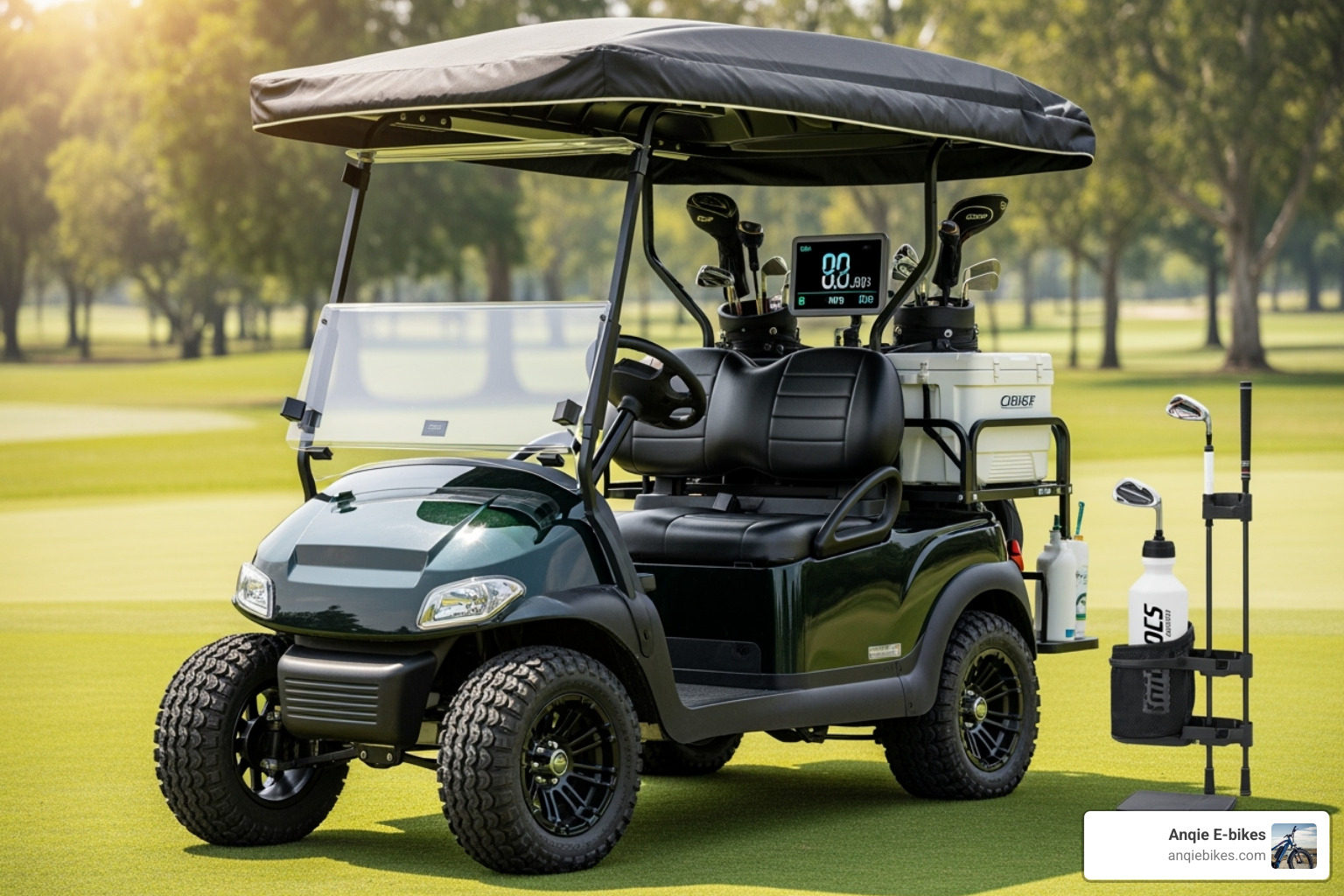
Are Mini Golf Carts Street-Legal?
Most mini golf carts are not street-legal out of the box. Their top speeds (often 9-10 mph) are below the minimum requirements for a Low-Speed Vehicle (LSV). To qualify as an LSV, a cart needs DOT-approved lights, mirrors, a windshield, seat belts, a VIN, and the ability to reach 20-25 mph. It must also be registered and insured. For a general overview of LSV requirements, see the NHTSA page on Low-Speed Vehicles.
Mini carts are best suited for private property, RV parks, and gated communities. Always check with your local DMV or municipal office for specific rules, as regulations vary by location. Assume you’ll be sticking to private roads and designated areas.
Maintenance and Customization
A little attention goes a long way in keeping your cart running smoothly.
Battery Care: This is the most important task. Modern Lithium Iron Phosphate (LiFePO4) batteries are low-maintenance; just avoid fully draining them and charge regularly. Older lead-acid systems require more attention, like checking water levels.
Tires and Brakes: Regularly check tire pressure for optimal range and handling. Inspect hydraulic disc brakes for fluid levels and pad wear to ensure safety.
General Inspection: Periodically check that all nuts and bolts are tight and keep the cart clean to prevent corrosion.
For the fun partcustomizationyou have many options. Practical upgrades like roof canopies and windshields offer weather protection. Storage baskets and cargo racks increase carrying capacity. For a personal touch, consider upgraded wheels, all-terrain tires, or LED lighting. Tech add-ons like USB ports and Bluetooth speakers can also improve your experience.
When you need parts or accessories, stick with reputable suppliers. Our team at Anqie E-bikes can help you find the right components and accessories for your specific model.
Start with a great base like our Kandi Collapsible Mini Electric Golf Cart and make it uniquely yours.
Frequently Asked Questions about Mini Golf Carts
Here are answers to the most common questions we hear from prospective buyers.
How much do mini golf carts typically cost?
Mini golf carts are significantly more affordable than their full-sized counterparts. While traditional carts cost $10,000-$15,000, mini carts have a much friendlier price point. Budget-friendly models like the Kandi Mini start around $3,500. More specialized versions with lifted suspensions or higher speeds range from $6,000 to $7,900. Even at the high end, you’re typically paying less than half the price of a new full-sized cart.
How hard is it to transport a mini golf cart?
Portability is a primary advantage. Most are designed for easy transport, with collapsible models like the Kandi Mini shrinking to fit in SUVs, minivans, or RV storage compartments. This eliminates the need for a trailer. However, they are not lightweight, typically weighing between 300 and 500 pounds. You will need a good set of ramps for safe loading and unloading. Once you have a system, taking your cart on adventures becomes simple.
What is the real-world range on a single charge?
Most mini golf carts deliver a real-world range of 20-25 miles on a single charge, which is more than enough for a full day of use in a campground or neighborhood. The Kandi Mini, for example, offers a solid 25-mile range. That actual range is affected by terrain, passenger weight, and driving style. Since they charge from a standard outlet in 4-6 hours, you can easily recharge overnight.
To learn more about specifications and features, you can explore our Kandi Collapsible Mini Electric Golf Cart.
Conclusion: Is a Mini Golf Cart Right for You?
After exploring mini golf cart reviews, it’s clear these compact vehicles offer a sweet spot of practicality for many people. If you need an easy way to get around your RV park, neighborhood, or large property, a mini golf cart could be the perfect solution.
The key benefits are compelling. Portability allows you to take your cart anywhere without a trailer. Affordability makes electric mobility accessible, with prices starting around $3,500 instead of $10,000+. And the quiet, eco-friendly operation is a bonus for you and your neighbors.
Modern mini carts offer impressive performance. Models like the Kandi Mini handle varied terrain well, and their lithium batteries provide a reliable range of 20-25 miles, which is ample for daily use.
However, they aren’t for everyone. If you need a street-legal vehicle for public roads or regularly transport more than two or three people, a mini cart likely won’t meet your needs. For those seeking personal mobility with an exercise component, an e-bike is a fantastic alternative.
The bottom line: Mini golf carts excel at providing affordable, portable, and eco-friendly transportation for private communities, campgrounds, and large properties. If your lifestyle aligns with their capabilities, you’ll likely find one to be an invaluable addition.
Ready to bring home the convenience and fun of compact electric transportation? We’ve got you covered.
Explore our Kandi Collapsible Mini Electric Golf Cart
Whether you have questions about models, customization, or maintenance, our team at Anqie E-bikes is here to help. We believe in providing expert guidance to help you find the perfect fit for your lifestyle.
